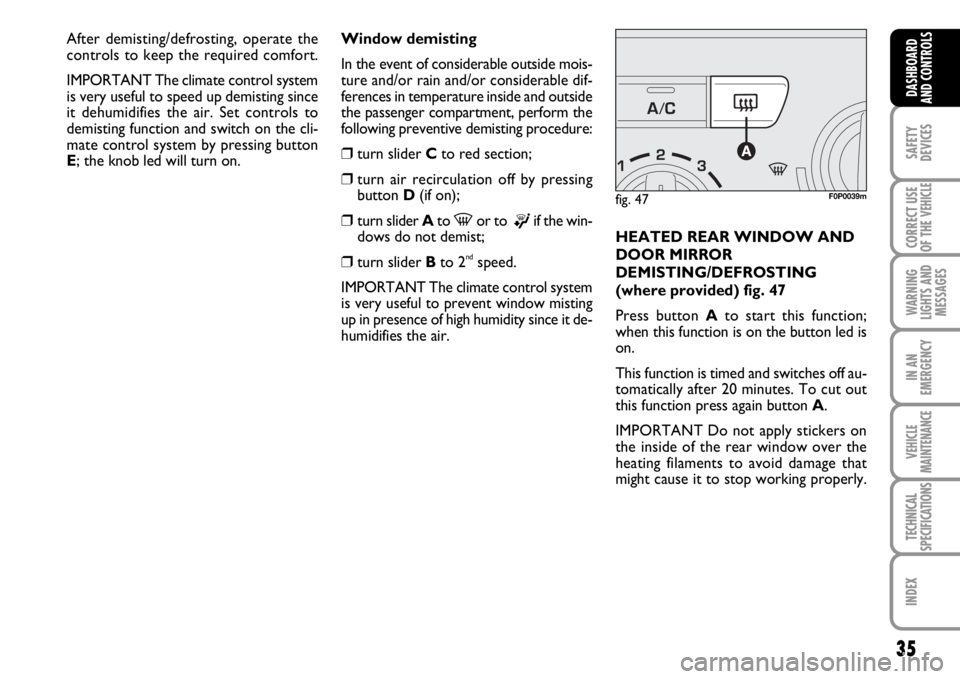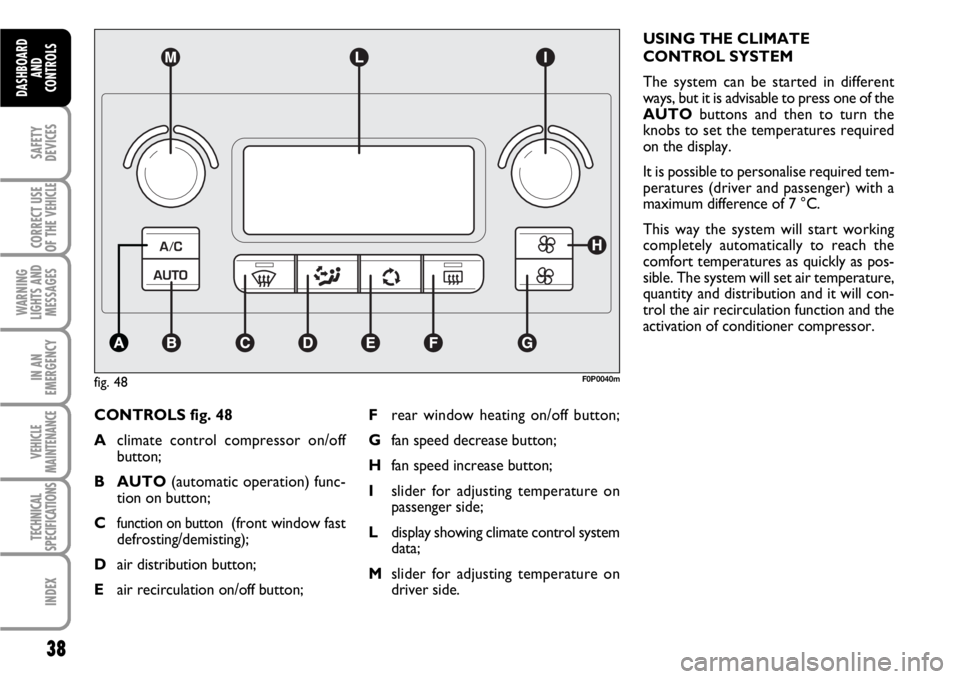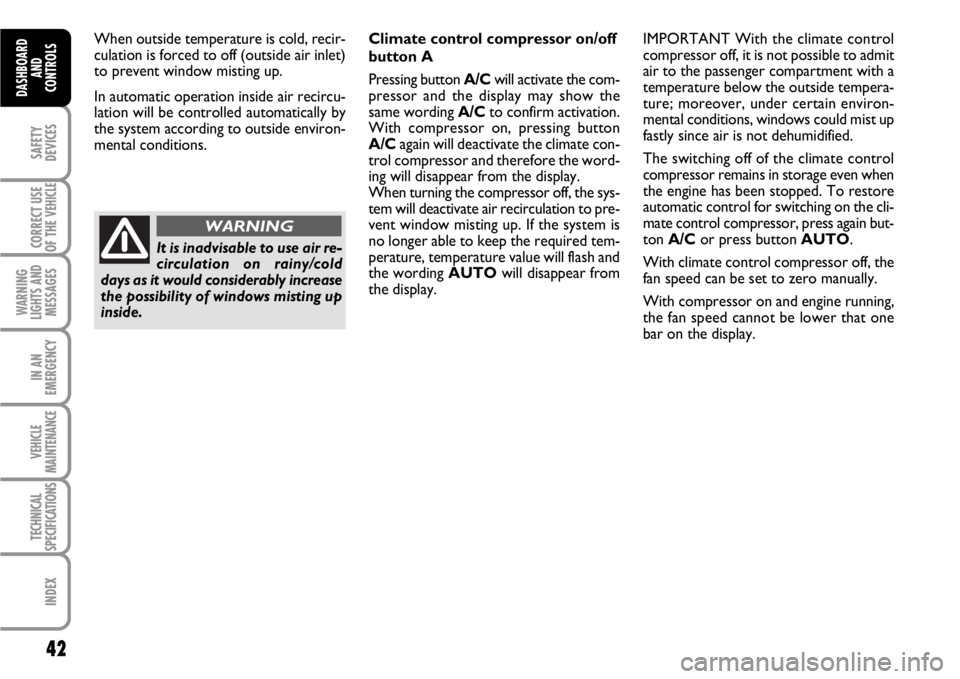technical specifications FIAT SCUDO 2010 Owner handbook (in English)
[x] Cancel search | Manufacturer: FIAT, Model Year: 2010, Model line: SCUDO, Model: FIAT SCUDO 2010Pages: 210, PDF Size: 3.32 MB
Page 35 of 210

34
SAFETY
DEVICES
CORRECT USE
OF THE
VEHICLE
WARNING
LIGHTS AND
MESSAGES
IN AN
EMERGENCY
VEHICLE
MAINTENANCE
TECHNICAL
SPECIFICATIONS
INDEX
DASHBOARD
AND
CONTROLS
HEATING
Proceed as follows:
❒turn slider Cto red section;
❒turn slider Ato the required symbol;
❒turn slider Bto the required speed;FAST HEATING
For fast heating of the passenger com-
partment, proceed as follows:
❒turn slider Cto red section;
❒turn air recirculation on by pressing
button D (if off);
❒turn slider Ato ∂;
❒turn slider Bto 4-p(max. fan
speed).
Then use the controls to keep the re-
quired comfort conditions and press but-
ton Dto turn air recirculation off.
IMPORTANT With cold engine, you have
to wait for a few minutes to let the sys-
tem fluid reach the operating temperature.FRONT WINDOW FAST
DEMISTING/
DEFROSTING (WINDSCREEN
AND SIDE WINDOWS)
Proceed as follows:
❒turn slider Cto red section;
❒turn slider Bto 4-p(max. fan
speed);
❒turn slider Ato -.
❒turn air recirculation off by pressing
button D(if on).
Page 36 of 210

35
SAFETY
DEVICES
CORRECT USE
OF THE
VEHICLE
WARNING
LIGHTS AND
MESSAGES
IN AN
EMERGENCY
VEHICLE
MAINTENANCE
TECHNICAL
SPECIFICATIONS
INDEX
DASHBOARD
AND CONTROLS
Window demisting
In the event of considerable outside mois-
ture and/or rain and/or considerable dif-
ferences in temperature inside and outside
the passenger compartment, perform the
following preventive demisting procedure:
❒turn slider Cto red section;
❒turn air recirculation off by pressing
button D(if on);
❒turn slider Ato -or to ®if the win-
dows do not demist;
❒turn slider Bto 2ndspeed.
IMPORTANT The climate control system
is very useful to prevent window misting
up in presence of high humidity since it de-
humidifies the air.HEATED REAR WINDOW AND
DOOR MIRROR
DEMISTING/DEFROSTING
(where provided) fig. 47
Press button Ato start this function;
when this function is on the button led is
on.
This function is timed and switches off au-
tomatically after 20 minutes. To cut out
this function press again button A.
IMPORTANT Do not apply stickers on
the inside of the rear window over the
heating filaments to avoid damage that
might cause it to stop working properly.
fig. 47F0P0039m
After demisting/defrosting, operate the
controls to keep the required comfort.
IMPORTANT The climate control system
is very useful to speed up demisting since
it dehumidifies the air. Set controls to
demisting function and switch on the cli-
mate control system by pressing button
E; the knob led will turn on.
Page 37 of 210

36
SAFETY
DEVICES
CORRECT USE
OF THE
VEHICLE
WARNING
LIGHTS AND
MESSAGES
IN AN
EMERGENCY
VEHICLE
MAINTENANCE
TECHNICAL
SPECIFICATIONS
INDEX
DASHBOARD
AND
CONTROLS
LOOKING AFTER THE SYSTEM
During winter, the climate control system
must be turned on at least once a month
for about 10 minutes. Before summer,
have the system checked at a Fiat Deal-
ership.
The system is filled with
R134a refrigerant which will
not pollute the environment
in the event of leakage. Un-
der no circumstances should R12 fluid
be used as it is incompatible with the
system components.IMPORTANT The inside air recirculation
system makes it possible to reach the re-
quired “heating” or “cooling” conditions
faster.
Do not use the air recirculation function
on rainy/cold days as it would consider-
ably increase the possibility of the win-
dows misting inside. AIR RECIRCULATION fig. 46
Turn this function on by pressing button
Ω.
This function is particularly useful when
the outside air is heavily polluted (in a traf-
fic jam, tunnel etc.). However, it is better
not to use it for long periods, especially
if there are several people in the vehicle.
Page 38 of 210

37
SAFETY
DEVICES
CORRECT USE
OF THE
VEHICLE
WARNING
LIGHTS AND
MESSAGES
IN AN
EMERGENCY
VEHICLE
MAINTENANCE
TECHNICAL
SPECIFICATIONS
INDEX
DASHBOARD
AND CONTROLS
AUTOMATIC TWO-ZONE
CLIMATE CONTROL
SYSTEM
(where provided)
DESCRIPTION
The vehicle is fitted with a two-zone cli-
mate control system which makes it pos-
sible to separately adjust the air temper-
atures and air distribution on the driver’s
side and on the passenger’s side.
Temperature control is based on the
“equivalent temperature” logic, i.e.: the
system continuously works to keep con-
stant the comfort inside the passenger
compartment and to compensate any vari-
ation of the outside climate conditions, in-
cluding sunshine detected by a proper sen-
sor provided for the purpose.
The climate control system automatically
controls and adjusts the following para-
meters and functions:
❒air temperature at driver/front passen-
ger vents;
❒air distribution at driver/front passen-
ger vents;
❒fan speed (continuous air flow variation);
❒compressor activation (to cool/dehu-
midify air);
❒air recirculation.All the above functions can be changed
manually by selecting the required func-
tion/s and by changing the set parameters.
In this way the automatic control is de-
activated; the system will resume auto-
matic control only for safety reasons.
Manual selections prevail over automatic
ones and remain in storage until the user
decides to resume automatic control
(press button AUTO, except when the
system cuts in for particular safety condi-
tions. The control of functions not
changed manually remains automatic.
The amount of air admitted to the pas-
senger compartment does not depend on
the vehicle speed, since it is electronical-
ly controlled by the fan. The temperature
of the air admitted to the passenger com-
partment is always controlled automati-
cally according to the temperatures set on
the driver’s and front passenger’s display
(except when the system is off or under
certain conditions when the compressor
is off).The following parameters and functions
can be set or changed manually:
❒ air temperatures on driver/front pas-
senger side;
❒ fan speed (continuous variation);
❒air distribution on seven levels (dri-
ver/front passenger side);
❒ climate control compressor on/off en-
able;
❒monozone/two-zone distribution prior-
ity;
❒ fast demisting/defrosting;
❒ air recirculation;
❒ rear heated window;
❒system deactivation.
Page 39 of 210

38
SAFETY
DEVICES
CORRECT USE
OF THE
VEHICLE
WARNING
LIGHTS AND
MESSAGES
IN AN
EMERGENCY
VEHICLE
MAINTENANCE
TECHNICAL
SPECIFICATIONS
INDEX
DASHBOARD
AND
CONTROLS
CONTROLS fig. 48
Aclimate control compressor on/off
button;
B AUTO(automatic operation) func-
tion on button;
C
function on button (front window fast
defrosting/demisting);
Dair distribution button;
Eair recirculation on/off button;USING THE CLIMATE
CONTROL SYSTEM
The system can be started in different
ways, but it is advisable to press one of the
AUTObuttons and then to turn the
knobs to set the temperatures required
on the display.
It is possible to personalise required tem-
peratures (driver and passenger) with a
maximum difference of 7 °C.
This way the system will start working
completely automatically to reach the
comfort temperatures as quickly as pos-
sible. The system will set air temperature,
quantity and distribution and it will con-
trol the air recirculation function and the
activation of conditioner compressor.
fig. 48F0P0040m
Frear window heating on/off button;
Gfan speed decrease button;
Hfan speed increase button;
Islider for adjusting temperature on
passenger side;
Ldisplay showing climate control system
data;
Mslider for adjusting temperature on
driver side.
Page 40 of 210

39
SAFETY
DEVICES
CORRECT USE
OF THE
VEHICLE
WARNING
LIGHTS AND
MESSAGES
IN AN
EMERGENCY
VEHICLE
MAINTENANCE
TECHNICAL
SPECIFICATIONS
INDEX
DASHBOARD
AND CONTROLS
During fully automatic operation, the on-
ly manual settings required are the fol-
lowing:
❒Ωair recirculation, to keep it always
on or off;
❒-to speed up demisting/defrosting
of windscreen, side windows, rear win-
dow and door mirrors;
❒(to demist/defrost heated rear win-
dow and door mirrors;
❒πto select air distribution during ven-
tilation.
During full automatic system operation,
you can change at any time set tempera-
tures, air distribution and fan speed by us-
ing the relevant buttons or knobs: the sys-
tem will automatically change its settings
to adjust to the new requirements.Air temperature adjusting knobs
M - I
Turning the knobs clockwise or counter-
clockwise, respectively increases or de-
creases the temperature of the air required
respectively in the front left zone (knob M)
and in the right zone (knob I) f the passen-
ger compartment. Since the system controls
two zones of the passenger compartment,
it is possible to personalise required tem-
peratures (driver and passenger) with a
maximum difference of 7 °C.
The temperatures set are shown on the dis-
play near the relevant knobs. Pressing but-
ton AUTOwill activate automatic opera-
tion in order to have two separate ventila-
tion temperatures between driver and pas-
senger’s side.
With automatic operation on, pressing again
button AUTOwill align the temperature
on the passenger’s side with that on the dri-
ver’s side.
Turn the knobs fully clockwise or counter-
clockwise to engage respectively HI(max-
imum heating) or LO(maximum cooling).
To deactivate these two functions, just
turn the temperature knob and set the re-
quired temperature.Front air distribution button D
Pressing this button it is possible to
choose manually one of the seven possi-
ble air distributions to the passenger com-
partment (right or left side):
æAir flow to the windscreen and front
side window vents to demist or de-
frost them.
øAir flow at central and side dash-
board vents to ventilate the chest and
the face during the hot season.
¿Air flow towards the front and rear
lower parts of the passenger com-
partment. Due to the natural ten-
dency of heat to spread upwards, this
type of distribution allows heating of
the passenger compartment in the
shortest time, also giving a prompt
feeling of warmth.
Page 41 of 210

40
SAFETY
DEVICES
CORRECT USE
OF THE
VEHICLE
WARNING
LIGHTS AND
MESSAGES
IN AN
EMERGENCY
VEHICLE
MAINTENANCE
TECHNICAL
SPECIFICATIONS
INDEX
DASHBOARD
AND
CONTROLS
¡Splitting of the air flow between the
vents to the lower part of the pas-
senger compartment (warmest air)
and the dashboard centre and side
outlets (coolest air). This air flow dis-
tribution is particularly useful in
spring and autumn when the sun is
shining.
¬Splitting of the air flow between
windscreen and front side window
demisting/defrosting vents and the
lower part of the passenger com-
partment. This type of air distribution
allows satisfactory heating of the pas-
senger compartment while prevent-
ing possible misting of the windows.
√Splitting of the air flow between
windscreen demisting/defrosting
vents and central and side dashboard
vents. This type of air distribution al-
lows satisfactory ventilation when the
sun is shining.
πSplitting of the air flow between all
vehicle vents.The type of air distribution, when select-
ed by hand, is shown by lighting up of the
relevant led on the selected button.
In the combined function, pressing a but-
ton will activate the relevant function
whereas, pressing a button relevant to an
already operating function will turn off this
function and the relevant button led.
To restore automatic air distribution con-
trol after a manual selection, press button
AUTO.
When the driver selects air distribution to
the windscreen, also the air distribution
on passenger side will be distributed to the
windscreen. The passenger can however
select the required air distribution by
pressing the relevant buttons.Fan speed adjusting buttons G - H
Press button Gpto decrease the fan
speed and therefore the amount of air ad-
mitted into the passenger compartment.
Press button Hpto increase the fan
speed and therefore the amount of air ad-
mitted into the passenger compartment,
although keeping the required tempera-
ture set.
The fan speed is shown by the lit bars of
the fan symbol pon the display:
❒max fan speed = all bars lit;
❒min fan speed = one bar lit.
The fan can be cut off only if the climate
control compressor has been switched off
pressing button A.
IMPORTANT To restore automatic fan
speed control after a manual adjustment,
press button AUTO.
Page 42 of 210

41
SAFETY
DEVICES
CORRECT USE
OF THE
VEHICLE
WARNING
LIGHTS AND
MESSAGES
IN AN
EMERGENCY
VEHICLE
MAINTENANCE
TECHNICAL
SPECIFICATIONS
INDEX
DASHBOARD
AND CONTROLS
AUTO button
(automatic operation on/off)
Pressing button AUTOthe system auto-
matically adjusts the amount and distribu-
tion of the air admitted to the passenger
compartment, cancelling all the previous
manual adjustments. Manual operation of
at least one automatic function (air recir-
culation, air distribution, fan speed or cli-
mate control compressor off).
IMPORTANT Should the system (after
manual settings) be no longer able to guar-
antee the required temperature set in the
passenger compartment, the set tempera-
ture value will start flashing to indicate this
condition, after one minute the AUTO
message will turn off.To restore system automatic control at
any time, after one or more manual ad-
justments, press button AUTO.
Pressing again button AUTOautomati-
cally aligns the temperature on the pas-
senger side with that on the driver side,
it is therefore possible to set the same
temperature and air distribution between
the two zones by turning the knob on dri-
ver side. This function is provided to sim-
plify temperature adjustment of the whole
passenger compartment when only the
driver is onboard. Separate operation of
set temperature and air distribution is re-
stored by pressing the button AUTO
again.Air recirculation on/off button E
Air recirculation works according to the
following operating logics:
❒automatic switching on, by pressing one
of the AUTObuttons and indicated by
the turning on of the AUTOicon on the
display.
❒manual switching on, by pressing but-
ton E, indicated by symbol
Ωon the
display;
❒manual switching off, by pressing but-
ton E, indicated by the turning off of
symbol
Ωon the display.
IMPORTANT The inside air recirculation
system makes it possible to reach the re-
quired heating or cooling conditions faster.
It is however inadvisable to use it on
rainy/cold days as it would considerably
increase the possibility of the windows
misting inside, especially if the climate con-
trol system is off.
Page 43 of 210

42
SAFETY
DEVICES
CORRECT USE
OF THE
VEHICLE
WARNING
LIGHTS AND
MESSAGES
IN AN
EMERGENCY
VEHICLE
MAINTENANCE
TECHNICAL
SPECIFICATIONS
INDEX
DASHBOARD
AND
CONTROLS
When outside temperature is cold, recir-
culation is forced to off (outside air inlet)
to prevent window misting up.
In automatic operation inside air recircu-
lation will be controlled automatically by
the system according to outside environ-
mental conditions.Climate control compressor on/off
button A
Pressing button A/Cwill activate the com-
pressor and the display may show the
same wording A/Cto confirm activation.
With compressor on, pressing button
A/Cagain will deactivate the climate con-
trol compressor and therefore the word-
ing will disappear from the display.
When turning the compressor off, the sys-
tem will deactivate air recirculation to pre-
vent window misting up. If the system is
no longer able to keep the required tem-
perature, temperature value will flash and
the wording AUTOwill disappear from
the display.IMPORTANT With the climate control
compressor off, it is not possible to admit
air to the passenger compartment with a
temperature below the outside tempera-
ture; moreover, under certain environ-
mental conditions, windows could mist up
fastly since air is not dehumidified.
The switching off of the climate control
compressor remains in storage even when
the engine has been stopped. To restore
automatic control for switching on the cli-
mate control compressor, press again but-
ton A/Cor press button AUTO.
With climate control compressor off, the
fan speed can be set to zero manually.
With compressor on and engine running,
the fan speed cannot be lower that one
bar on the display.
It is inadvisable to use air re-
circulation on rainy/cold
days as it would considerably increase
the possibility of windows misting up
inside.
WARNING
Page 44 of 210

43
SAFETY
DEVICES
CORRECT USE
OF THE
VEHICLE
WARNING
LIGHTS AND
MESSAGES
IN AN
EMERGENCY
VEHICLE
MAINTENANCE
TECHNICAL
SPECIFICATIONS
INDEX
DASHBOARD
AND CONTROLS
Fast window demisting/defrosting
button C
Press this button: the climate control sys-
tem will automatically switch on all the
functions required for fast windscreen and
front side window demisting/defrosting,
that is:
❒switches on climate control compressor
when climatic conditions are suitable;
❒air recirculation off;
❒maximum air temperature HIon both
areas;
❒activates proper fan speed according to
engine coolant temperature to limit the
flow into the passenger compartment of
air not warm enough to demist the win-
dows;
❒directs air flow to windscreen and front
side windows vents;
❒turns heated rear window on.
IMPORTANT Fast demisting/defrosting
function stays on for about 3 minutes,
since engine coolant temperature reach-
es the proper temperature.When the max. demisting/defrosting func-
tion is on, the button led and the heated
rear window button led are on.
When the max. demisting/defrosting func-
tion is on, the only manual operations pos-
sible are manual adjustment of the fan
speed and switching heated rear window
off. Pressing the max. demisting/defrost-
ing button or the air recirculation buttons
or compressor off button or the AUTO
button, the system switches off the max.
demisting/defrosting function and restores
the operating conditions of the system pri-
or to turning it on.Heated rear window and door
mirror demisting/defrosting button
(where provided) F
Press this button to activate heated rear
window demisting/defrosting.
When this function is on, the button led
is on.
This function is timed and switches off au-
tomatically after about 20 minutes or by
pressing again the button or by turning the
engine off. It will not be switched on au-
tomatically when restarting the engine.
IMPORTANT Do not apply stickers on the
inside of the rear window over the heat-
ing filaments to avoid damage that might
cause it to stop working properly.